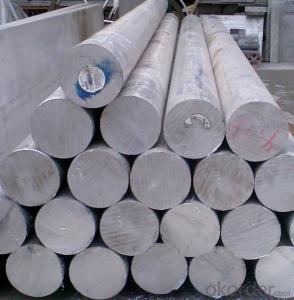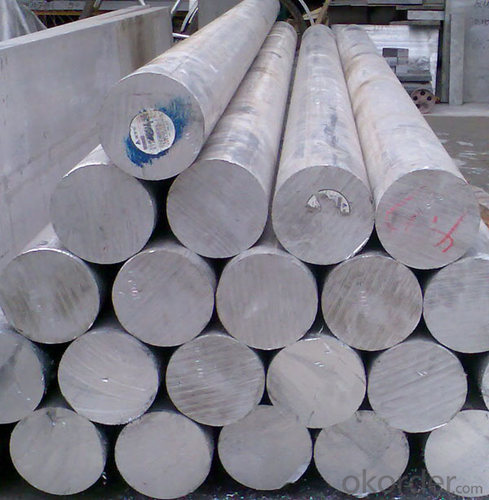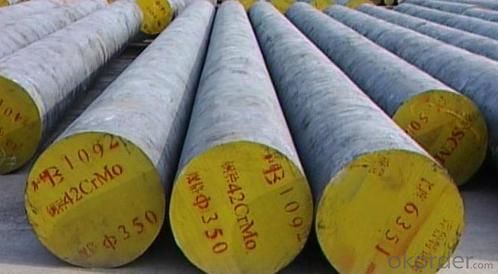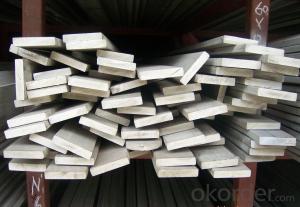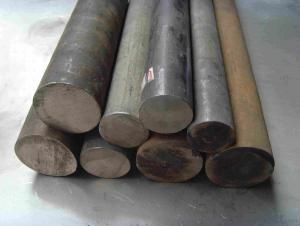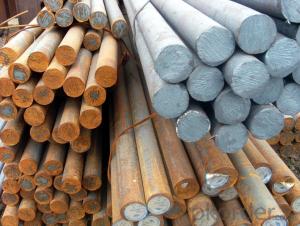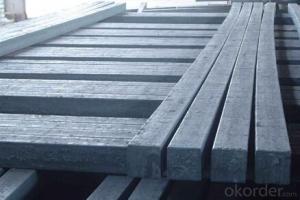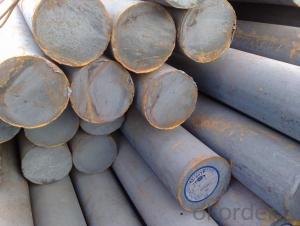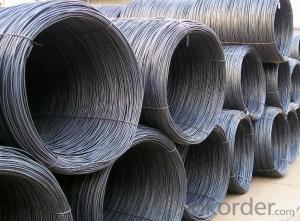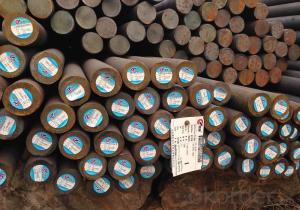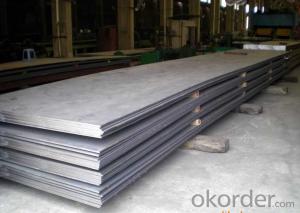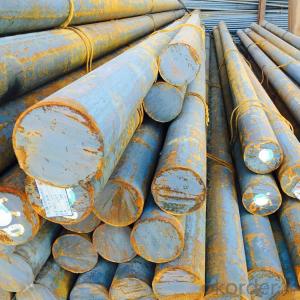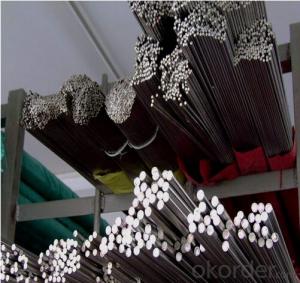Steel SCr440 Mild Carbon Steel Special Steel
- Loading Port:
- China main port
- Payment Terms:
- TT OR LC
- Min Order Qty:
- 25 m.t.
- Supply Capability:
- 10000 m.t./month
OKorder Service Pledge
OKorder Financial Service
You Might Also Like
Specification
1.round steel
2.ISO9001:2008 certificate
3.Competive price and Best quality
4.On-time delivery
Chemical Composition(GB)%
| C | Si | Mn | Cr | Ni |
| 0.37-0.44 | 0.17-0.37 | 0.50-0.80 | 0.80-1.10 | ≤0.30 |
Heat Treatment
| Item | Temperature ℃ | Hardness |
| Normalizing | 850-870 | 179-229HB |
Characterstics: Which has the best comprehensive mechanical properties
Applications
| 1.Can be used for drawing die and plastic mould | |||
| 2.Can be used for middle and small punch |
Product show:

Workshop show:

FAQ:
1, Your advantages?
professional products inquiry, products knowledge train (for agents), smooth goods delivery, excellent customer solution proposale
2, Test & Certificate?
SGS test is available, customer inspection before shipping is welcome, third party inspection is no problem
3, Payment Terms?
30% TT as deposit and 70% before delivery.
Irrevocable L/C at sight.
4, Trading Terms?
EXW, FOB, CIF, FFR, CNF
5, After-sale Service?
We provides the services and support you need for every step of our cooperation. We're the business partner you can trust.
For any problem, please kindly contact us at any your convenient time.
We'll reply you in our first priority within 24 hours.
- Q: How does special steel contribute to the waste management industry?
- Special steel contributes to the waste management industry by providing durable and corrosion-resistant materials for the construction of waste handling equipment and infrastructure. Special steel is used to manufacture waste containers, compactors, shredders, and incinerators, ensuring their longevity and efficiency in handling waste. Additionally, special steel is utilized in the construction of waste treatment plants and landfill facilities, providing structural strength and resistance to harsh environmental conditions. Overall, special steel plays a crucial role in enhancing the effectiveness and sustainability of waste management practices.
- Q: Can special steel be used in the production of precision instruments?
- Yes, special steel can be used in the production of precision instruments. Special steel, known for its high strength, corrosion resistance, and heat resistance, provides the necessary durability and stability required for precise measurements and operations in precision instruments.
- Q: How does special steel contribute to reducing product lead times?
- Special steel contributes to reducing product lead times by offering several advantages. Firstly, special steel is known for its high strength and durability, allowing manufacturers to produce parts that can withstand harsh conditions and heavy usage. This ensures that the products made with special steel have a longer lifespan, reducing the need for frequent repairs or replacements. Secondly, special steel can be fabricated into complex shapes and sizes, enabling manufacturers to produce intricate components with high precision. This eliminates the need for additional machining processes, saving time and reducing lead times. Lastly, special steel often has improved mechanical properties, such as higher hardness or heat resistance, which can enhance the performance of the final product. This allows manufacturers to meet specific requirements and deliver high-quality products more efficiently, ultimately reducing lead times.
- Q: What are the factors to consider when selecting special steel for a specific application?
- When selecting special steel for a specific application, some important factors to consider include the required strength and hardness, corrosion resistance, temperature resistance, machinability, weldability, and cost. Other factors may include the desired surface finish, dimensional stability, availability, and any specific industry or regulatory requirements.
- Q: How does special steel contribute to reducing product waste?
- Special steel contributes to reducing product waste by offering superior strength, durability, and corrosion resistance. This allows manufacturers to produce longer-lasting and more reliable products, minimizing the need for frequent replacements. Additionally, special steel's high precision and customization capabilities enable the creation of components with tight tolerances, reducing the risk of assembly errors and subsequent product failures. Consequently, special steel helps optimize product performance and longevity, thereby reducing waste generated from premature product disposal.
- Q: How does special steel contribute to the corrosion resistance of products?
- Special steel contributes to the corrosion resistance of products through its unique composition and manufacturing processes. It is specifically designed to have a higher resistance to corrosion compared to regular steel. Special steel contains various alloying elements such as chromium, nickel, and molybdenum, which form a protective layer on the surface of the steel, preventing the corrosive agents from reaching the underlying metal. Additionally, the manufacturing techniques used for special steel, such as heat treatment and controlled cooling, further enhance its corrosion resistance properties. Overall, special steel plays a crucial role in ensuring the durability and longevity of products by minimizing the effects of corrosion.
- Q: How does special steel contribute to the automotive noise reduction?
- Special steel contributes to automotive noise reduction in several ways. Firstly, it is durable and strong, allowing for the construction of thinner and lighter components. This reduces the overall weight of the vehicle, resulting in reduced road and engine noise. Additionally, special steel has excellent vibration-damping properties, which helps absorb and minimize noise generated by the engine, suspension, and other moving parts. The use of special steel in the design of automotive structures and panels also helps reduce noise transmission from the outside environment into the cabin, providing a quieter and more comfortable driving experience for passengers.
- Q: How does special steel contribute to the construction of infrastructure projects?
- Special steel plays a crucial role in the construction of infrastructure projects by providing enhanced strength, durability, and resistance to corrosion. It is commonly used in critical structural components such as beams, columns, and reinforcement bars, ensuring the stability and longevity of buildings, bridges, and other infrastructure. Additionally, special steel alloys offer flexibility in design, making it possible to create structures that are lighter and more cost-effective without compromising safety or structural integrity.
- Q: How does special steel contribute to the automotive racing machinery industry?
- Special steel contributes to the automotive racing machinery industry by providing high strength, durability, and superior performance. It is used in the construction of various components such as engine parts, chassis, and suspension systems, enabling the vehicles to withstand extreme conditions and achieve higher speeds. Special steel also allows for weight reduction, improving fuel efficiency and maneuverability. Overall, it plays a crucial role in enhancing the performance and reliability of racing cars, making them more competitive on the track.
- Q: What are the applications of special steel in the power generation supply chain?
- Special steel has various applications in the power generation supply chain, primarily due to its high strength, corrosion resistance, and ability to withstand extreme temperatures. It is commonly used in the construction of power plant components such as turbines, boilers, and heat exchangers. Special steel is also utilized in the manufacturing of transmission towers, electrical transformers, and generator rotor shafts. Overall, its superior properties enhance the efficiency, reliability, and longevity of power generation equipment, ensuring a stable and uninterrupted energy supply.
Send your message to us
Steel SCr440 Mild Carbon Steel Special Steel
- Loading Port:
- China main port
- Payment Terms:
- TT OR LC
- Min Order Qty:
- 25 m.t.
- Supply Capability:
- 10000 m.t./month
OKorder Service Pledge
OKorder Financial Service
Similar products
Hot products
Hot Searches
Related keywords
